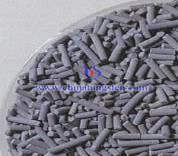Tungsten Trioxide for Hydrodesulfurization Catalyst Containing Molecular Sieve
- Details
- Category: Tungsten Information
- Published on Thursday, 28 April 2016 18:22
 With the increasing demand for diesel fuel, prolific diesel has become a development direction of the catalytic cracking process. LCO will bring a serious environmental pollution of combustion exhaust toxic gases (such as SOx) increasing, therefore, hydrodesulfurization catalyst can be used to reduce their emission of toxic gases. The introducing of molecular sieve in the hydrodesulfurization catalyst will help to improve the property of catalyst.
With the increasing demand for diesel fuel, prolific diesel has become a development direction of the catalytic cracking process. LCO will bring a serious environmental pollution of combustion exhaust toxic gases (such as SOx) increasing, therefore, hydrodesulfurization catalyst can be used to reduce their emission of toxic gases. The introducing of molecular sieve in the hydrodesulfurization catalyst will help to improve the property of catalyst.
Molecular sieve refers to a class of substances which have uniform micropores with molecular size; it can be applied to desiccants efficient, selective sorbents, catalysts, ion-exchange and so on. Hydrodesulfurization catalyst containing molecular sieve not only has a high denitrification activity, but also has higher aromatics saturation and selective naphthenic ring opening activity.
The composition of each substance in the catalysts is as following:
1. Tungsten trioxide, nickel oxide, molybdenum oxide as a main active components, they are from the source of tungsten, molybdenum, nickel salts as precursor, and calcined at 550 ° C for 4 hours; wherein, nickel oxide accounting for 1% to 10% of the total mass of the catalyst, the mass of tungsten oxide and nickel oxide takes 10 to 50%, and the balance being the carrier.
2. The carrier is the mixture of molecular sieve and one of aluminum oxide, silicon oxide or both of both.
In addition, before the hydrodesulfurization catalyst including molecular sieve using, it usually pre-vulcanized with sulfur, hydrogen sulfide or sulfur-containing material in the presence of hydrogen under 140-370°C; it is worth mentioning that, the pre-vulcanization process can not only carried out outside of the reactor, but also situ-vulcanized inside, and converted to the sulfide. This kind of tungsten trioxide hydrodesulfurization catalyst containing molecular sieve can be used for hydrotreating a hydrocarbon feedstock, especially for diesel hydrotreating, particularly the upgrading processes of low-grade diesel hydrogenation.
| Tungsten Oxide Supplier: Chinatungsten Online www.tungsten-oxide.com | Tel.: 86 592 5129696; Fax: 86 592 5129797;Email:sales@chinatungsten.com |
| Tungsten News & Prices, 3G Version: http://3g.chinatungsten.com | Molybdenum News & Molybdenum Price: http://news.molybdenum.com.cn |



 sales@chinatungsten.com
sales@chinatungsten.com